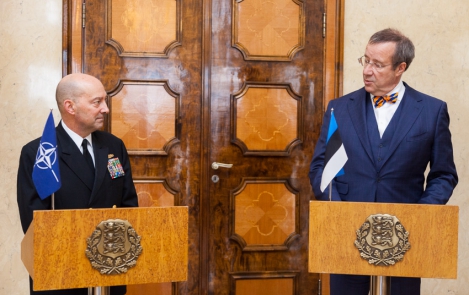-
Reset
+

President Ilves's laudatio to Admiral James Stavridis in Kadriorg, 17 April 2013
17.04.2013
Dear Admiral Stavridis,
For me the opportunity and right of the President to confer decorations represents a means to confirm the values for which Estonia stands, to demonstrate what Estonia considers to be important and what Estonia is grateful for. The Order of the Cross of the Eagle, First Class represents our highest recognition of your work both for my country as well as maintaining a robust defence of the democratic alliance we belong to. We are grateful for your outstanding leadership both as the Commander of the US European Command and as the Supreme Allied Commander Europe. We admire your crucial role in strengthening the NATO Alliance to meet the challenges of the modern security environment, to include enhancing our collective capabilities and partnerships. Not the least of which, from our point of view, is your critical role in developing defence plans for the Baltic countries and Poland. This Cross of the Eagle is a sign of our thanks for your support to Estonia and the principles that Estonia holds dear.
Dear Admiral,
In your blog you recently outlined three big agenda items that NATO today faces. I could not agree more.
First, NATO's current operation in Afghanistan shows that the Alliance is able to operate in multiple theatres in a sustainable and successful way. Indeed, an orderly handover of ISAF's security responsibilities to the Afghans by the end of 2014 will be crucial. Yet, we recognize as well that the world as a whole is not likely to become a more peaceful place when ISAF mission is over. NATO, therefore, must be ready at all times to respond to future security challenges. We cannot allow the Alliance to run out of steam.
That is why I welcome discussions within the Alliance on how to maintain NATO's agility and interoperability after the ISAF mission has been successfully concluded. It is crucial that in these discussions all NATO Allies are listened to, taken into consideration in the deliberations and that decisions are acted upon. We need to take advantage of the comparative strengths of each member within the Alliance.
Second, cybersecurity needs to be taken seriously by all Allies. The changes in the digital world today represent a dramatically sped-up version of the changes the world underwent in a century of industrialization. When we think of the revolution in the military that accompanied industrialization, then we need to realize the same will happen with the IT revolution. We must all realize that cybersecurity means defending the entirety of our societies. Or to put it another way: cybersecurity is not simply a matter of military defence. We need to re-examine many assumptions of security. In cyberspace, no country is an island.
Thirdly, for me, the sine qua non of the successful defence of NATO borders remains a strong and steadfast transatlantic link. This link is based on the solidarity, unity of purpose and collective decision-making that goes on day to day, and has done so decade to decade since the Alliance was formed and that has continued through multiple expansions. This has created a deep, genuine and unbreakable bond between the US, Canada and European Allies; and it has been this way for generations. NATO is a truly unique organisation in this regard – it is our common home.
Two things give me greater confidence to say so in a world that since the end of the Cold War has been transformed completely. The first is the idea of a TAFTA or the Transatlantic Free Trade Area. In an era where economic well-being is ever more a component of our security a free trade arrangement between the EU and our allies across the Atlantic is crucial. This will bind these two regions of shared democratic values closer than they ever have been, beyond military cooperation. We in Estonia very strongly support the idea of an EU – US free trade agreement.
The second development is the slow but steady disappearance of the one-time distinction between "old" and "new" Europe when it comes to the Alliance. When we look at what used to be called the "new" Europe, we see that we do rather well and have turned out to be very good Allies. I hope that as we come up to the 10th anniversary next April of our becoming Allies, the distinction will have completely disappeared.
Dear Admiral Stavridis,
You are highly valued for your leadership, as a Commander of US EUCOM, as a SACEAUR, and in your post-military life. Estonia counts on your continued support for the strong transatlantic links and for a strong NATO.
Congratulations.


